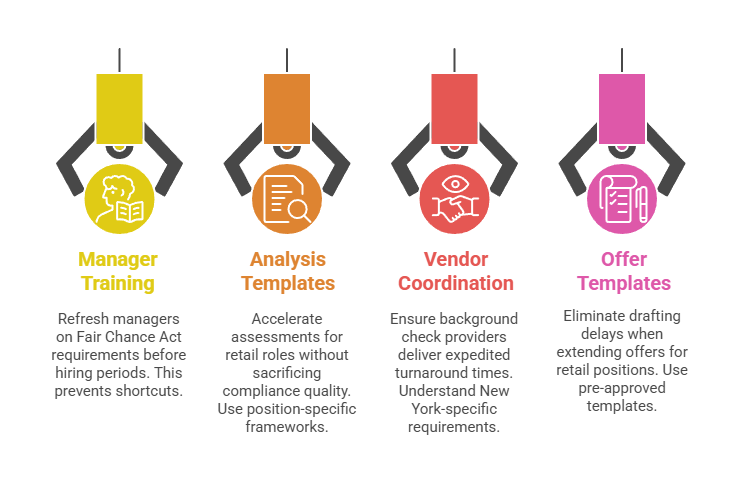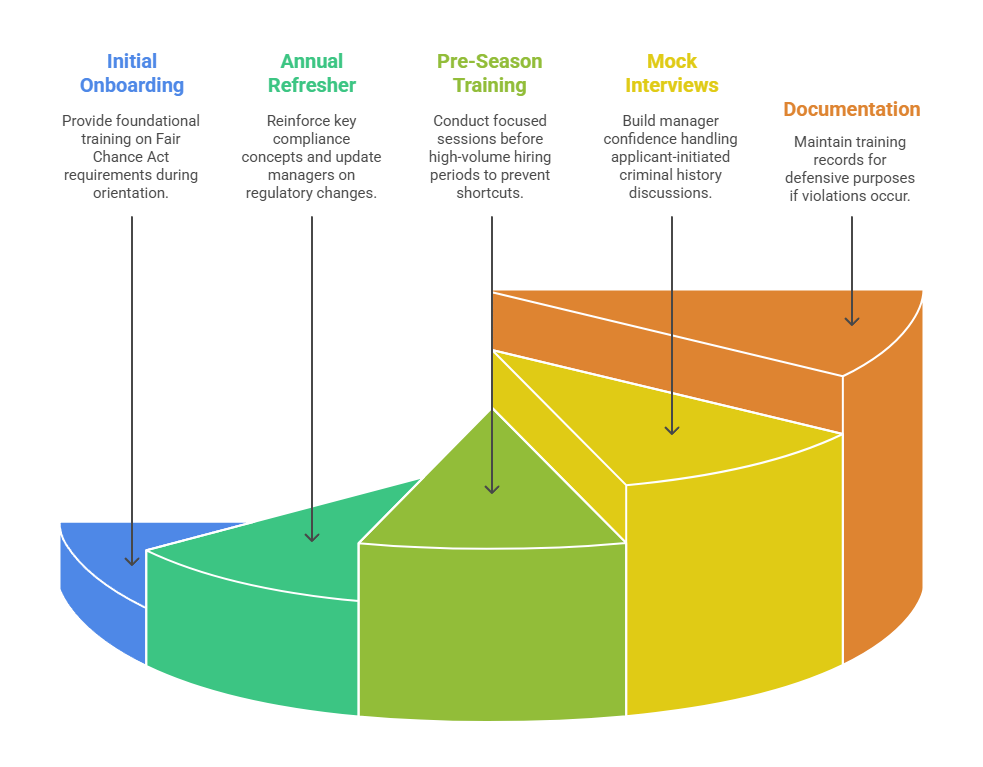Retail employers conducting background checks in New York must navigate a complex dual-layer compliance framework. This framework encompasses New York State Article 23-A's prohibition against unfair criminal history discrimination and New York City's Fair Chance Act, which delays criminal history inquiries until after conditional job offers. This guide provides actionable compliance strategies for multi-location retail chains operating across NYC boroughs.
Key Takeaways
- New York retail employers must wait until after making a conditional job offer before inquiring about criminal history under NYC's Fair Chance Act, with limited exceptions for specific positions.
- Article 23-A requires individualized assessments considering eight statutory factors before denying employment based on criminal records, rather than blanket exclusion policies.
- Multi-location retail chains operating across NYC boroughs must apply the most restrictive local ordinances to ensure consistent compliance across all locations.
- Retail employers must provide written Article 23-A analysis documents to applicants before taking adverse action, including a minimum three-business-day waiting period for applicant response.
- Fair chance hiring laws for retail workers explicitly prohibit asking about sealed, expunged, or youthful offender adjudications during any stage of the hiring process.
- New York ban the box retail employment regulations require removing criminal history questions from job applications, though exceptions exist for legally mandated background checks.
- Retail background check compliance necessitates separate FCRA authorization forms that cannot be bundled with job applications or other employment documents.
- New York retail employee screening requirements impose civil penalties ranging from $500 to $1,000 per violation for non-compliant criminal history inquiries or adverse actions.
Understanding New York's Dual-Layer Background Check Framework
New York retail background checks operate under two distinct legal frameworks. State law under Correction Law Article 23-A establishes baseline protections. New York City's Fair Chance Act imposes additional timing restrictions. Retail employers must understand how these laws interact to develop compliant screening protocols.
New York State Article 23-A Requirements
Article 23-A prohibits employers from denying employment based solely on criminal convictions. Exceptions exist when a direct relationship exists between the conviction and the employment sought. Employers can also deny employment if hiring would create unreasonable risk to property or public safety.
This law requires individualized assessments using eight statutory factors. The factors include specific duties of the position, time elapsed since the offense, and the applicant's age at conviction. Other factors encompass seriousness of the offense, evidence of rehabilitation, and legitimate business interests. Retail employers cannot establish categorical exclusion policies. Each application requires separate analysis documenting how the conviction relates to the position's responsibilities.
NYC Fair Chance Act Timing Restrictions
The Fair Chance Act changes when retail employers can inquire about criminal history. Covered employers cannot ask about criminal convictions until after making a conditional job offer. This "ban the box" requirement applies to employers with four or more employees. The timing restriction shifts background checks from initial screening to the final hiring stage.
The conditional offer must be specific regarding position, compensation, and start date. Retail chains must ensure hiring managers cannot discuss criminal history during interviews. The timing restriction extends to third-party background check vendors who cannot conduct searches until the employer extends a valid conditional offer.
Retail-Specific Compliance Challenges and Solutions

Multi-location retail chains face distinct operational challenges when implementing New York retail employee screening requirements. Understanding retail-specific nuances helps employers develop sustainable screening protocols. Customized compliance frameworks address high-volume retail hiring environments.
Multi-Borough Coordination Requirements
Retail chains must apply Fair Chance Act requirements uniformly across NYC's five boroughs. Corporate HR teams need standardized conditional offer templates and Article 23-A analysis worksheets. This prevents violations when transferring employees between locations or centralizing hiring functions.
Store-level hiring managers require specific training on prohibited interview questions. Many retail environments feature decentralized hiring where individual store managers conduct interviews. Corporate compliance teams should implement approval workflows requiring headquarters review before adverse actions. This ensures consistent application of Article 23-A factors across the organization.
High-Volume Hiring Process Modifications
Retail background check compliance extends traditional hiring timelines significantly. Seasonal hiring surges create particular compliance risks when retailers need to onboard large employee volumes quickly. Advance planning helps mitigate these delays while maintaining legal compliance.

- Pre-season manager training: Refresh store managers on Fair Chance Act requirements before high-volume hiring periods to prevent shortcuts.
- Standardized analysis templates: Accelerate assessments for common retail roles without sacrificing compliance quality through position-specific frameworks.
- Vendor partnership coordination: Ensure background check providers deliver expedited turnaround times while understanding New York-specific requirements.
- Conditional offer template libraries: Eliminate drafting delays when extending offers for various retail positions through pre-approved templates.
A typical compliant timeline now spans 7-14 business days from final interview to start date.
The Article 23-A Analysis Process for Retail Positions
Conducting compliant individualized assessments represents the most complex aspect of New York retail background checks. The analysis must be documented, defensible, and specifically connected to the position's actual responsibilities. Each evaluation requires thoughtful application of the eight statutory factors.
Applying the Eight Statutory Factors
Each Article 23-A analysis must address all eight factors established in Correction Law Section 752. The analysis should be position-specific rather than company-wide. A theft conviction carries different implications for a warehouse position versus a cash-handling cashier role.
| Factor Category | Retail-Specific Considerations |
| Public Policy Supporting Rehabilitation | Note time since conviction, completion of sentence, parole/probation status |
| Specific Duties of Position | Detail actual job responsibilities like cash handling and inventory access |
| Bearing of Criminal Offense on Job Fitness | Analyze direct relationship between conviction type and position risks |
| Time Since Offense | Consider conviction date and offense-free period; 5+ years generally weakens relevance |
| Age at Time of Offense | Compare conviction age to current age, particularly for offenses before age 25 |
| Seriousness of Offense | Distinguish between felony/misdemeanor and violent/non-violent categorizations |
| Rehabilitation Evidence | Document employment references, skills training, community involvement |
| Employer's Legitimate Interest | Articulate specific risks rather than generalized concerns |
The analysis should conclude with an explanation directly referencing the factor evaluation.
Position-Specific Risk Assessment Examples
Different retail positions present varying risk profiles. Cash-handling positions warrant closer scrutiny of financial crime convictions. However, time elapsed and rehabilitation evidence can overcome initial concerns. A 10-year-old theft conviction for someone with a clean employment history may not justify exclusion.
Positions involving minor supervision require careful evaluation. However, convictions don't automatically justify exclusion absent specific legal prohibitions. The analysis must document specific supervisory responsibilities and whether the conviction bears direct relationship to these duties.
Required Notifications and Waiting Periods
New York ban the box retail employment regulations establish specific procedural requirements for adverse actions. These notifications provide applicants an opportunity to respond before final decisions. Failing to follow precise procedures exposes employers to lawsuits and regulatory enforcement.
Pre-Adverse Action Documentation Requirements
Before denying employment based on criminal history, retail employers must provide written documentation. The Article 23-A analysis must explain the tentative decision with sufficient detail. Applicants must understand which convictions concern the employer and why.
The pre-adverse action notice must include copies of background check reports and a summary of rights documents. Retail employers should create a standard package containing all required documents. Applicants must receive at least three business days to respond. The waiting period begins when the employer provides the documentation.
Final Adverse Action Procedures
Employers proceeding with adverse action must provide final written notification. The final notice must state the decision and explain appeal rights. It should reference the employer's consideration of any information submitted during the waiting period.
NYC's Fair Chance Act provides applicants three years to challenge adverse actions. Retail employers should retain complete documentation for at least four years. This documentation proves essential for defending against challenges.
Exemptions and Special Circumstances in Retail
Fair chance hiring laws apply broadly, but certain exemptions exist. Understanding when exemptions apply prevents retailers from unnecessarily restricting hiring options. Misapplying exemptions creates the same liability as failing to follow requirements.
Legally Mandated Background Check Exceptions
Positions where law prohibits employing individuals with specific convictions fall outside Fair Chance Act timing restrictions. However, the exemption applies narrowly to criminal history directly prohibited by law.
Few retail positions face legally mandated restrictions. Pharmacy technicians represent one retail category with explicit legal restrictions. Certain drug-related felony convictions prohibit pharmacy technician certification. Retailers may inquire about relevant criminal history before conditional offers for these positions. However, the exemption doesn't extend to other store positions.
Positions with Direct Law Enforcement Responsibilities
The Fair Chance Act exempts positions whose primary purpose involves law enforcement functions. However, this exemption rarely applies in retail. Store security officers don't typically qualify unless they're sworn peace officers certified under New York Criminal Procedure Law.
Retail employers sometimes conflate positions requiring security clearances with law enforcement exemptions. A position requiring facility security clearance doesn't automatically qualify for early criminal history inquiries. The timing restrictions apply unless the position itself performs law enforcement functions.
Internal Policy Development for Retail Chains
Developing comprehensive written policies demonstrates good faith compliance efforts. Written policies provide consistent guidance for decentralized hiring operations. Clear policies help prevent inadvertent violations by store-level staff.
Creating New York-Specific Hiring Protocols
Retail chains need jurisdiction-specific hiring protocols reflecting New York's unique requirements. A centralized policy framework with state-specific appendices works effectively for multi-state retailers.
The New York appendix should detail several key compliance elements. It should cover conditional offer timing requirements and Article 23-A analysis procedures. It should also address required notifications and mandatory waiting periods. Store-level managers require practical tools like flowcharts showing when background checks can be initiated. Decision trees guide evaluators through Article 23-A factor analysis. The written policy should designate clear responsibility for conducting analyses.
Training Requirements for Hiring Managers
Comprehensive training programs represent critical compliance infrastructure. Training content should address prohibited interview questions, conditional offer timing, and escalation procedures. Role-playing exercises help managers practice responding to challenging scenarios.

- Initial manager onboarding: Provide foundational training on Fair Chance Act requirements during orientation.
- Annual refresher sessions: Reinforce key compliance concepts and update managers on regulatory changes.
- Pre-season training: Conduct focused sessions before high-volume hiring periods to prevent shortcuts.
- Mock interview scenarios: Build manager confidence handling applicant-initiated criminal history discussions.
- Documentation requirements: Maintain training records for defensive purposes if violations occur.
Training documentation helps establish that violations represent isolated errors rather than systemic practices.
FCRA Compliance Considerations for Retail Employers
Beyond New York-specific requirements, retail background check compliance requires adherence to federal Fair Credit Reporting Act standards. FCRA establishes separate disclosure, authorization, and adverse action requirements. Violating FCRA creates federal liability separate from New York law violations.
Disclosure and Authorization Procedures
FCRA requires employers to provide clear written disclosure that a consumer report may be obtained. The disclosure must appear in a standalone document containing no other information. Retailers cannot include the disclosure within job applications.
This standalone requirement creates challenges for retailers using integrated digital hiring systems. Many retailers violate FCRA through seemingly minor design choices like including company logos on the same document. The authorization should specify that it permits background checks throughout employment if the employer intends periodic re-screening.
Adverse Action Notice Requirements
FCRA establishes separate adverse action notice requirements when employers use consumer reports. However, employers can satisfy both FCRA and Article 23-A through integrated processes. A comprehensive pre-adverse action package should include all required elements.
The final adverse action notice must identify the consumer reporting agency. It must include agency contact information and explain that the agency didn't make the adverse decision. Retailers should develop templates incorporating both FCRA and New York requirements in one comprehensive communication.
Enforcement Landscape and Penalty Exposure
Understanding New York's enforcement mechanisms helps employers appreciate compliance stakes. Multiple enforcement channels exist including private lawsuits, administrative complaints, and regulatory investigations. Retailers should prioritize appropriate investments in compliant systems.
Government Enforcement Actions
New York State Division of Human Rights enforces Article 23-A through administrative complaints. The Division can award compensatory damages and civil penalties up to $50,000 for willful violations.
NYC Commission on Human Rights enforces the Fair Chance Act with broader remedies. It can impose civil penalties up to $250,000 for willful violations. Typical penalties range from $500 to $1,000 per violation for non-willful infractions. The Commission has pursued pattern-or-practice investigations against multi-location retailers when evidence suggests systemic non-compliance.
Private Litigation Risks
The Fair Chance Act authorizes private lawsuits for up to three years after violations. Applicants can recover compensatory damages, civil penalties, and attorneys' fees. Plaintiff-side employment attorneys increasingly focus on Fair Chance Act violations.
Class certification represents particular concern for multi-location retailers. Evidence of common violations across multiple stores can affect dozens or hundreds of applicants. Recent settlements have reached six and seven figures. Retailers should review insurance coverage specifically for these claims.
Conclusion
New York retail background checks require sophisticated compliance frameworks balancing multiple legal obligations. Multi-location retail chains must implement consistent procedures and train hiring managers on complex requirements. The investment in compliant systems protects retailers from enforcement exposure while supporting fair chance hiring objectives that expand talent pools.
Frequently Asked Questions
Can retail employers in New York ask about criminal history during job interviews?
No, under NYC's Fair Chance Act, covered employers cannot inquire about criminal history until after making a conditional job offer. This prohibition applies to interview questions, application forms, and any pre-offer screening. The only exceptions are positions with legally mandated restrictions. Store managers must avoid criminal history discussions even when applicants voluntarily raise the topic.
What's the difference between New York State Article 23-A and NYC's Fair Chance Act?
Article 23-A is a state law prohibiting unfair discrimination based on criminal convictions. It requires individualized assessments using eight statutory factors. The Fair Chance Act is a New York City law adding timing restrictions. The Fair Chance Act governs when inquiries can occur, while Article 23-A governs how criminal history must be evaluated.
How long must retail employers wait before taking adverse action based on criminal history?
Employers must provide applicants with the Article 23-A analysis and background check results, then wait at least three business days for response. This waiting period begins when the employer provides required documentation. The total timeline typically spans 7-14 business days from conditional offer to final decision.
Do retail background check requirements apply to promotions and internal transfers?
Article 23-A's individualized assessment requirements apply to both external hiring and internal promotions when criminal history is considered. However, NYC's Fair Chance Act timing restrictions generally don't apply to current employees. Retailers must still conduct Article 23-A analyses and provide required notifications before adverse actions.
Can retailers ask about pending criminal charges that haven't resulted in convictions?
No, New York employers cannot inquire about or consider pending arrests or charges without convictions. The Fair Chance Act explicitly prohibits questions about arrests not resulting in convictions. Background checks revealing pending charges should be excluded from employment decisions.
What criminal records can never be considered in New York retail hiring decisions?
Employers cannot inquire about sealed or expunged records, youthful offender adjudications, or arrests not resulting in convictions. They also cannot consider convictions vacated or reversed. Certain older marijuana convictions may be sealed. Employers should review reports carefully to ensure prohibited information wasn't included.
How should retailers handle applicants with certificates of relief from disabilities?
Certificates of relief create a legal presumption of rehabilitation. While certificates don't automatically require hiring, they represent strong rehabilitation evidence that should weigh heavily in assessments. Employers denying employment despite certificates face an elevated burden to justify their decision.
Are background check requirements different for temporary or seasonal retail positions?
No, New York retail employee screening requirements apply equally to temporary, seasonal, and permanent positions. Retailers cannot skip conditional offer requirements for short-term positions. The same timing restrictions and waiting periods apply regardless of employment duration.
Additional Resources
- New York State Correction Law Article 23-A: Licensure and Employment of Persons Previously Convicted of One or More Criminal Offenses
https://www.nysenate.gov/legislation/laws/COR/750 - NYC Commission on Human Rights: Fair Chance Act Guidance
https://www.nyc.gov/site/cchr/law/fair-chance-act.page - New York State Division of Human Rights: Correction Law Article 23-A Guidance
https://dhr.ny.gov/sites/default/files/pdf/correction-law-article-23a-licensure-packet.pdf - Federal Trade Commission: Background Checks - What Employers Need to Know
https://www.ftc.gov/business-guidance/resources/background-checks-what-employers-need-know - NYC Administrative Code Title 8: Fair Chance Act Legal Text
https://codelibrary.amlegal.com/codes/newyorkcity/latest/NYCadmin/0-0-0-6343
